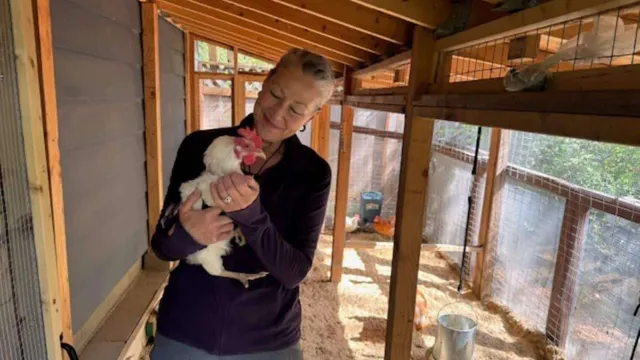
City fines woman $80,000 despite granting chicken permit
2025-06-28 00:00- Kathryn Sarkisian received a city permit to keep chickens but was later fined due to a neighbor's complaint.
- The city of Douglas failed to notify neighbors about their right to object before issuing the permit.
- Sarkisian is suing the city of Douglas, claiming the ordinance violates her due process rights.
Express your sentiment!
Insights
In Douglas, Michigan, Kathryn Sarkisian obtained a permit to keep chickens after receiving approval from the city. Shortly after, however, the city reversed its decision and ordered her to remove the chickens due to a complaint from a neighbor. Despite having followed the proper permitting process, which included a 21-day window for neighbor objections, the city failed to notify neighbors until after the permit was granted. As a result, Sarkisian has incurred approximately $80,000 in fines for refusing to comply with the city's demands. The financial burden escalated as the city also did not clarify when the fines began to accrue. If calculated from when Sarkisian started raising the chickens, the total could exceed $200,000. Sarkisian spent substantial funds—$23,000—constructing a coop and privacy fence anticipating compliance with local regulations. The fact that the city's oversight resulted in this predicament highlights a significant flaw in their ordinance implementation. Sarkisian has taken legal action against the city, arguing that their ordinance violates due process rights. The lawsuit claims the city’s regulations do not provide sufficient standards or avenues for appealing a neighbor's complaint. She has been supported in this legal battle by groups like the Pacific Legal Foundation and the Farm-to-Consumer Legal Defense Fund. This case draws attention to broader issues regarding local ordinances that govern backyard animals and the rights of residents. In recent months, similar cases involving chicken ordinances have emerged in Michigan, signaling a trend where local authorities struggle with regulation clarity and enforcement. The outcome of Sarkisian’s legal battle could potentially shape the future of such ordinances and set precedents regarding residents' rights in light of municipal regulations. As of now, the status of her six chickens—affectionately named Sugar, Sunshine, Cinnamon, Butter, Piper, and Queen Isabella—remains uncertain while debt and legal battles loom.
Contexts
Keeping chickens has become an increasingly popular practice across the United States, including in Michigan. This report provides an overview of the legal rights related to keeping chickens within the state, shining light on the regulations that vary significantly by locality. As of now, state law does not explicitly prohibit the keeping of chickens, but individual municipalities have the authority to establish their own ordinances regarding backyard fowl. It is vital for potential chicken owners to research local regulations governing animal husbandry to avoid violations that could lead to fines or the removal of their birds. In many urban areas of Michigan, zoning ordinances dictate whether residents can keep chickens, and the types and quantities allowed can differ widely. For instance, some cities may allow a limited number of hens without a permit, while others may require permits and impose conditions such as distance from property lines, minimum lot sizes, or the provision of adequate shelter and sanitation. Furthermore, certain localities may prohibit roosters altogether due to noise complaints, emphasizing the importance of understanding specific community rules. In addition to local ordinances, residents are encouraged to consider homeowners' association (HOA) rules or neighborhood covenants that may restrict the keeping of chickens. Even if local laws permit keeping poultry, private agreements among neighbors can impose additional limitations. It is essential for individuals interested in raising chickens to engage with their HOA or community groups to ensure compliance with all applicable guidelines. On the whole, the trend towards backyard chickens in Michigan reflects a growing movement towards self-sustainability and local food sources. However, prospective chicken keepers must prioritize thorough research to navigate the complexities of legal rights and responsibilities effectively. By understanding the local landscape of regulations and engaging with community-based standards, individuals can enjoy the benefits of raising chickens while ensuring compliance with all necessary legal requirements.